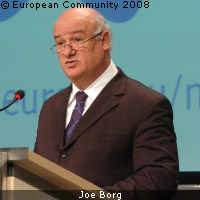Mediterranean fisheries policies must be based on science, says Borg
Scientific research should form the backbone of policies for the management of fisheries in the Mediterranean, EU Fisheries and Maritime Affairs Commissioner Joe Borg has said. Mr Borg was speaking at the Seventh Ministerial Meeting organised by the International Centre for Advanced Mediterranean Agronomic Studies (CIHEAM) taking place in Zaragoza, Spain, on 4 February. The meeting brought together the Agriculture and Fisheries Ministers of CIHEAM's 13 member countries. The Commissioner underlined the importance of international cooperation in addressing the challenges faced by the Mediterranean's fisheries. 'We are all too aware of the fact that our fish resources face increasing pressure, both from fisheries and from external factors such as pollution and climate change,' he said. 'These are challenges that we must face together - all coastal states bordering the Mediterranean - be they part of the European Union or otherwise.' According to Mr Borg, the best mechanism for multilateral cooperation is the General Fisheries Commission for the Mediterranean (GFCM). 'The GFCM must become an effective regional fisheries organisation in the truest sense of the word,' stated the Commissioner. 'It must be able to provide the scientific basis for adopting common fisheries management measures. It must aim at achieving the best levels of exploitation of marine resources. And it must simultaneously ensure a harmonisation of fisheries rules.' Mr Borg appealed to the assembled Ministers to use scientific research as the backbone of any action undertaken, and encouraged them to ensure that their national scientists play a full role in both the GFCM and ICCAT (the International Commission for the Conservation of Atlantic Tunas). He also pointed out that research institutes in non-EU Mediterranean countries could apply for support from the Seventh Framework Programme for Research (FP7), which covers fisheries and aquaculture research. 'This is a facility that could and should be made use of and I would encourage you to seize this, and other, similar, opportunities to engage in making your contribution to enhancing our scientific and empirical knowledge of the fisheries resources in the Med,' Mr Borg said. The 'Food, Agriculture and Fisheries, and Biotechnology' theme of FP7 aims to support the sustainability and competitiveness of fisheries by providing the scientific and technical basis for fisheries management. 'It is only by making informed policy choices - decisions that are based on solid, observable fact - that the measures adopted by policy-makers will receive the support and consensus that is needed if they are really and truly to succeed,' Mr Borg commented. The Commission is keen to boost scientific research in the Mediterranean, particularly in respect of fisheries, and the Commissioner told the meeting's delegates that he would like an opportunity to discuss this further in order to find the appropriate means by which to make this happen. Mr Borg also informed participants about the Commission's plans to develop a maritime strategy for the Mediterranean. This will focus on cooperation between the EU and non-EU Mediterranean countries in key fields including marine and maritime research. It will also address the sustainable economic development of maritime regions; cooperation on safety and surveillance; maritime governance of the Mediterranean; and maritime heritage and cultural dialogue. According to Mr Borg, pilot projects on maritime surveillance and spatial planning are set to be carried out over the course of this year. Meanwhile, a conference on maritime policy and the Mediterranean which will bring together all Mediterranean countries will be held in June. 'I hope that during 2008 and beyond we can use the tools we have at our disposal and pave the way for regular exchanges on maritime cooperation in the entire Mediterranean basin,' the Commissioner concluded.



